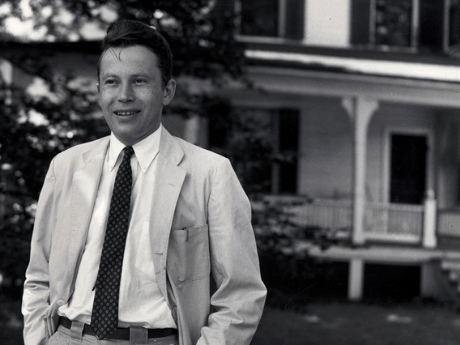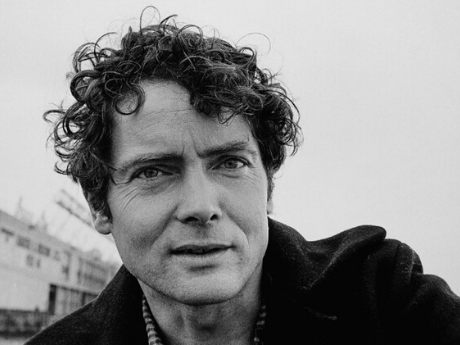Poems & Essays
First Loves
Poets on the first poems they adored. Edited by Carmela Ciuraru, and expanded into her anthology First Loves: Poets Introduce the Essential Poems that Captivated and Inspired Them.
W. S. Merwin: First Loves
One great stroke of luck for me, as I came to realize much later, was growing up hearing poetry read aloud from the Bible after breakfast—my parents reading to us, that is, before my sister or I had learned to read. The practice never developed much momentum, and it tailed off like the keeping of most journals, but it left in my ear the sound of my mother's voice (I knew my father's from church) reading psalms. The voice was the same that she used for everything but it was refracted by this remote, resonant, lingering language. I loved that more than I knew at first.
More Articles

Richard Wilbur: First Loves
There was no road-to-Damascus moment of childhood or adolescence at which poetry suddenly claimed me, but I took solid pleasure, as soon as I encountered them, in Stevenson's poems for children, and Lewis Carroll's brainy nonsense, and the lyric capabilities of Twain's colloquial prose.
First Loves: C. K. Williams
One day in Mexico in the spring of 1963, I was chatting about poetry with my then new and now old friend, the painter Bruce McGrew. I'd been writing poetry, or trying to write poetry, or working towards one day being able to write real poetry for six or seven years. I hadn't published anything yet, and I'd experienced poetry mostly as a labor I'd assigned myself, a task I toiled at, scribbling and studying and constantly thinking, brooding, going crazy about.

Carolyn Kizer: First Loves
Coached by my parents, I learned to read before I started school at age five and a half. My mother, who kept meticulous notes on my reading, somehow omitted Gertrude Stein, whose poem "Grass" was the first I learned by heart:
W. D. Snodgrass: First Loves
I have to confess that my first loves in poetry were outmoded and half-forgotten things that our teachers read aloud. I went to grade school in a small, industrial city (Beaver Falls, Pennsylvania) with a large immigrant population: Italian, Polish, Greek, Hungarian and Romanian. This made for a somewhat rough-and-tumble atmosphere. But we had some splendid teachers.
Ntozake Shange: First Loves
I always knew I liked poetry more than anything. More than boys. More than butterflies. More than fresh sheets on a hot St. Louis night. I'm not sure I liked poetry more than dancing or Jackie Wilson. Or sleeping on the second-floor screened porch when even fresh sweet sun-dried sheets were no match for the weight of the air of my sister's wandering limbs.
Maxine Kumin: First Loves
In grammar school when I was in the fourth or fifth grade, Miss Blomberg exhorted us to memorize work by such sterling American poets as Longfellow, Whittier, and Lowell. Gold stars were given out to those who could rise, face the class, and recite flawlessly, or nearly so, parts of "Tell me not, in mournful numbers / Life is but an empty dream" or "Blessings on thee, little man, / Barefoot boy with cheek of tan!" or, in my case, a sizable chunk of James Russell Lowell's "The Vision of Sir Launfal."

Marie Ponsot: First Loves
Thanks to lullabies, prayers, and Mother Goose, I had this much by heart before I could talk: Words say that people are present. And some words come together to make a place. It takes shape in the little stillness it causes to surround it, pleasing both speaker and listener.
Leslie Scalapino: First Loves
My first knowledge of poetry, in junior high and high school, was Homer and Shakespeare; and Greek tragedies, which are also poetry. I went to Reed College, where I took a poetry course from Kenneth Hansen in which we read Williams, Moore, Eliot, Stevens and Pound. I remember loving the poems of Williams, Stevens, and Moore.


